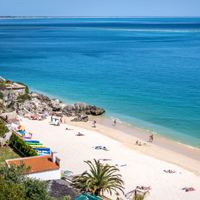Tips for Expats Driving in Lisbon
Summary: Driving in a new country can be daunting. These tips offer insight into what to expect when driving in Lisbon.
1. Understanding the Driving Culture
Driving in Lisbon can be a bit challenging for newcomers. The city is known for its narrow streets, steep hills, and heavy traffic, especially during rush hours. Portuguese drivers are also known for their aggressive driving style, so it's important to stay alert and cautious at all times. It's also worth noting that many of the road signs are in Portuguese, so it might be helpful to familiarize yourself with some basic road signs and rules before you start driving.
2. Choosing the Right Car
Given the city's hilly terrain and narrow streets, a small, compact car is usually the best choice for driving in Lisbon. Manual cars are more common in Portugal, but if you're not comfortable driving a manual, automatic cars are also available, though they may be more expensive.
3. Parking in Lisbon
Finding parking in Lisbon can be difficult, especially in the city center. Most parking spaces are metered, and the cost can add up quickly. There are also several parking garages available, but these can also be quite expensive. It's often easier and more cost-effective to use public transportation or walk when possible.
4. Driving with an International License
Foreigners can drive in Portugal with an international driving permit (IDP) for up to six months. After that, you will need to obtain a Portuguese driver's license. It's important to note that an IDP is not a standalone document, but rather a translation of your home country's driver's license, so you'll need to carry both your IDP and your original driver's license when driving.
5. Obtaining a Portuguese Driver's License
If you're planning to stay in Portugal for more than six months, you'll need to exchange your foreign driver's license for a Portuguese one. The process involves submitting an application to the Institute for Mobility and Transport (IMT), along with your original driver's license, a medical certificate, and proof of residency. You may also be required to take a driving test, depending on your home country's reciprocal agreements with Portugal.
6. Familiarize Yourself with Local Traffic Laws
Portugal has strict traffic laws, and violations can result in heavy fines. For example, using a mobile phone while driving is prohibited, and seat belts are mandatory for all passengers. Also, the legal blood alcohol limit is 0.05%, lower than in many other countries, so it's best to avoid drinking and driving altogether.

Welcome to Green Breeze, your gateway to unforgettable private yacht and boat rentals in the enchanting Troia and Comporta regions of Portugal. Whether you seek a serene escape on the calm waters of Troia or an adventurous voyage along the picturesque coast of Arrabida, we’ve got you covered. Our fleet offers a selection of meticulously maintained yachts and boats to cater to your every desire. Discover the perfect vessel to suit your dreams, from sleek motorboats to luxurious hybrid yachts.

Welcome to Green Breeze, your gateway to unforgettable private yacht and boat rentals in the enchanting Troia and Comporta regions of Portugal. Whether you seek a serene escape on the calm waters of Troia or an adventurous voyage along the picturesque coast of Arrabida, we’ve got you covered. Our fleet offers a selection of meticulously maintained yachts and boats to cater to your every desire. Discover the perfect vessel to suit your dreams, from sleek motorboats to luxurious hybrid yachts.
About the Author
 Betsy Burlingame is the Founder and President of Expat Exchange and is one of the Founders of Digital Nomad Exchange. She launched Expat Exchange in 1997 as her Master's thesis project at NYU. Prior to Expat Exchange, Betsy worked at AT&T in International
and Mass Market Marketing. She graduated from Ohio Wesleyan University
with a BA in International Business and German.
Betsy Burlingame is the Founder and President of Expat Exchange and is one of the Founders of Digital Nomad Exchange. She launched Expat Exchange in 1997 as her Master's thesis project at NYU. Prior to Expat Exchange, Betsy worked at AT&T in International
and Mass Market Marketing. She graduated from Ohio Wesleyan University
with a BA in International Business and German.
Some of Betsy's articles include 12 Best Places to Live in Portugal, 7 Best Places to Live in Panama and 12 Things to Know Before Moving to the Dominican Republic. Betsy loves to travel and spend time with her family. Connect with Betsy on LinkedIn.
Additional Information:
- 7 Weekend Getaways for Digital Nomads Living in Lisbon
- Fun Classes for Expats Living in Lisbon
- Best Bookstores and Libraries in Lisbon
- Public Transportation in Lisbon
- Best Markets in Lisbon
- Retire in Lisbon Guide
- 7 Tips for Living in Lisbon
- Pros & Cons of Living in Lisbon
- Tips for Expats Driving in Lisbon
- Cost of Living in Lisbon
- Health Care in Lisbon
- The Essential Guide to Lisbon
- Lisbon, Portugal
- 5 Tips for Living in Lisbon, Portugal
- 11 Best Neighborhoods in Lisbon
- Healthcare & Health Insurance in Portugal
- Best Places to Live in Portugal
- Real Estate in Portugal
- Essential Guide to the Health System in Portugal
- What It's Like Living in Lisbon
- Pros and Cons of Living in Portugal 2025
- 2025 Guide to Moving to Portugal
- More Advice about Retiring in Portugal





